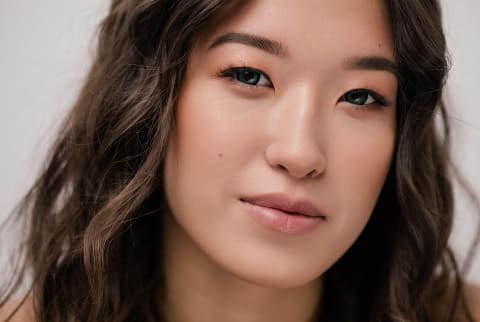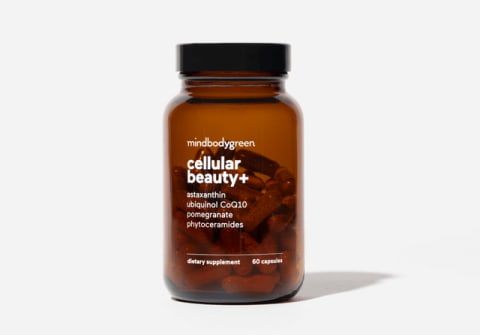Advertisement
Why You Should Supplement With CoQ10 As You Age*


Antioxidants come in a wide variety. Some are naturally made in the body; some we can only get externally. Some are water-soluble; others work within a lipid matrix. And each has its own individual function in the body, be it helping with collagen production (vitamin C) or supporting the immune system (zinc).*
Now, the antioxidant coenzyme Q10 has very special functions in the body.* CoQ10 is a fat-soluble compound that's found in all your cells (actually it's the only fat-soluble antioxidant your body naturally produces1). So, your cells need CoQ10 to produce energy2, as it's used in the mitochondria, or the "powerhouse" of the cell where electrons move along chemical pathways to make energy (hello, ATP).* CoQ10 transports those electrons in the pathways. The energy produced by these pathways is then used for normal cellular functions throughout our entire body.* So, yeah, it's important.
What you need to know about CoQ10 levels.
The good news is that, unlike vitamin D or other nutrients, CoQ10 deficiencies are not that common in the general population. But as you get older, those natural levels of CoQ10 start to decline, which may result in suboptimal mitochondrial function and inadequate cellular energy.* It's no wonder many medical practitioners encourage people to up their intake as they age.
Now, there are many types of antioxidants in which it's relatively easy to get your fill as long as you follow a robust diet. CoQ10 isn't one. Only about 25% of your CoQ10 levels3 come from food intake. If you are curious about food sources: It's naturally found in oily fish, organ meats like liver and kidney, legumes, and certain vegetables like spinach, broccoli, and cauliflower.
So what can you do to support your body and cells as you age? Ubiquinol is the most bioavailable form4 of the antioxidant, accounting for 90% of the CoQ10 in the blood. (Ubiquinone, on the other hand, must be converted to ubiquinol in the body before it's absorbed.) Ubiquinol CoQ10 is clinically shown to increase CoQ10 levels5 in the body on day one and beyond.* When in the body, ubiquinol helps your body deal with these free radicals6 head-on.* It also protects against lipid peroxidation7, a process by which free radicals damage cell membranes.* To top it off, CoQ10 protects the membranes of mitochondria and regenerates other antioxidants8, like vitamins C and E—both of which are just as important for healthy skin and body.* That's one busy antioxidant.
8 Sources
- https://www.ncbi.nlm.nih.gov/pmc/articles/PMC3178961/
- https://www.ncbi.nlm.nih.gov/pmc/articles/PMC4737275/
- https://lpi.oregonstate.edu/mic/dietary-factors/coenzyme-Q10
- https://pubmed.ncbi.nlm.nih.gov/27064932/
- https://pubmed.ncbi.nlm.nih.gov/16919858/
- https://pubmed.ncbi.nlm.nih.gov/26342738/
- https://www.ncbi.nlm.nih.gov/pmc/articles/PMC5514578/
- https://www.ncbi.nlm.nih.gov/pmc/articles/PMC6273282/
Watch Next
Enjoy some of our favorite clips from classes
Enjoy some of our favorite clips from classes
What Is Meditation?
Mindfulness/Spirituality | Light Watkins
Box Breathing
Mindfulness/Spirituality | Gwen Dittmar
What Breathwork Can Address
Mindfulness/Spirituality | Gwen Dittmar
The 8 Limbs of Yoga - What is Asana?
Yoga | Caley Alyssa
Two Standing Postures to Open Up Tight Hips
Yoga | Caley Alyssa
How Plants Can Optimize Athletic Performance
Nutrition | Rich Roll
What to Eat Before a Workout
Nutrition | Rich Roll
How Ayurveda Helps Us Navigate Modern Life
Nutrition | Sahara Rose
Messages About Love & Relationships
Love & Relationships | Esther Perel
Love Languages
Love & Relationships | Esther Perel
What Is Meditation?
Box Breathing
What Breathwork Can Address
The 8 Limbs of Yoga - What is Asana?
Two Standing Postures to Open Up Tight Hips
How Plants Can Optimize Athletic Performance
What to Eat Before a Workout
How Ayurveda Helps Us Navigate Modern Life
Messages About Love & Relationships
Love Languages
Advertisement

What Men Are Getting Wrong About Mental Health, From A Psychologist
Stephen B. Poulter, PhD

Your Grandma's Go-To Supplement Is Once Again Popular (For A Good Reason)
Molly Knudsen, M.S., RDN

What Men Are Getting Wrong About Mental Health, From A Psychologist
Stephen B. Poulter, PhD

Your Grandma's Go-To Supplement Is Once Again Popular (For A Good Reason)
Molly Knudsen, M.S., RDN














